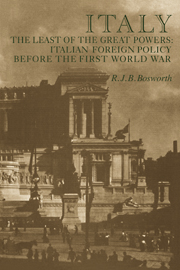Book contents
- Frontmatter
- Contents
- Dedication
- Preface
- List of maps
- 1 Society and politics in Liberal Italy
- 2 New political pressure groups and foreign policy
- 3 The making of a Foreign Minister: Antonino Di San Giuliano
- 4 The Consulta: the bureaucrats of foreign policy
- 5 How Italy went to Libya
- 6 How Italy stayed in Libya
- 7 The politics of alliance: Italy in the Triple Alliance, 1912–1914
- 8 The politics of friendship: Italy, the Triple Entente, and the search for a new Mediterranean agreement, 1911–1914
- 9 ‘Un cliente maleducato’: Italy in the Dodecanese and Ethiopia, 1912–1914
- 10 Preparing to digest some spoils: Italian policy towards Turkey, 1912–1914
- 11 San Giuliano's epilogue. The realities of European war 28 June to 16 October 1914
- Conclusion
- Appendix I The Ten Commandments for Italians abroad
- Appendix II Pro-memoria on our politico-military situation, by A. Pollio
- Appendix III San Giuliano's poem about his funeral ceremony
- Abbreviations used in the notes and bibliography
- Select bibliography
- Notes
- Index
Appendix I - The Ten Commandments for Italians abroad
Published online by Cambridge University Press: 16 November 2009
- Frontmatter
- Contents
- Dedication
- Preface
- List of maps
- 1 Society and politics in Liberal Italy
- 2 New political pressure groups and foreign policy
- 3 The making of a Foreign Minister: Antonino Di San Giuliano
- 4 The Consulta: the bureaucrats of foreign policy
- 5 How Italy went to Libya
- 6 How Italy stayed in Libya
- 7 The politics of alliance: Italy in the Triple Alliance, 1912–1914
- 8 The politics of friendship: Italy, the Triple Entente, and the search for a new Mediterranean agreement, 1911–1914
- 9 ‘Un cliente maleducato’: Italy in the Dodecanese and Ethiopia, 1912–1914
- 10 Preparing to digest some spoils: Italian policy towards Turkey, 1912–1914
- 11 San Giuliano's epilogue. The realities of European war 28 June to 16 October 1914
- Conclusion
- Appendix I The Ten Commandments for Italians abroad
- Appendix II Pro-memoria on our politico-military situation, by A. Pollio
- Appendix III San Giuliano's poem about his funeral ceremony
- Abbreviations used in the notes and bibliography
- Select bibliography
- Notes
- Index
Summary
The patria is one only. Your patria is Italy. No other country can be loved by you like Italy.
Never speak the name of the patria without reverence, exalting the glories of your Italy which is one of the most ancient, noble and civilised nations in the world, be strengthened by those traditions and those energies, to which are entrusted her best fortunes. Do not complain if you have abandoned her to look somewhere else for what she could not give you.
Remember solemnly to celebrate national festivals. Lend a helping hand without stint whenever the patria is threatened. On this occasion and in all those relevant to the aspirations, the prestige and the dignity of the patria, forget your political party, your religious beliefs, and remember only that you are an Italian. Take the opportunity to mix among your co-nationals, educated and ignorant, rich and poor, Southern and Northern, conservative and progressive and treat them all as brothers, and refresh their spirit talking with them about the land in which you were born.
Honour the official Representatives of your Country. Offending them, you offend a little the patria; respect them even if sometimes they do not please you. Tolerate their defects, appreciate their qualities, do not put snags in their path, help them, if you can, in their useful activities.
[…]
- Type
- Chapter
- Information
- Italy the Least of the Great PowersItalian Foreign Policy Before the First World War, pp. 421 - 422Publisher: Cambridge University PressPrint publication year: 1979

